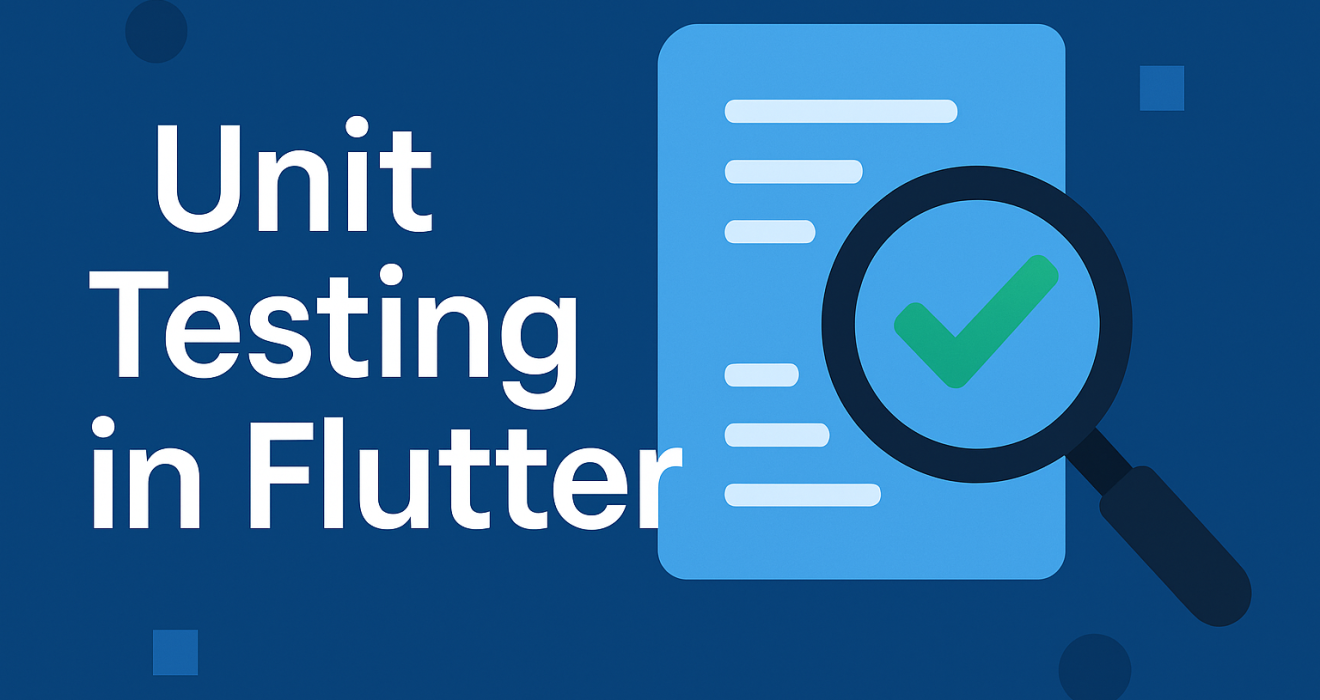Unit Testing in Flutter: A Complete Beginner’s Guide
Ensuring the reliability of your Flutter app starts with testing — and unit testing plays a foundational role. Whether you’re working on a small utility function or a service class, unit tests give you confidence that your logic works as intended.
In this blog post, we’ll cover:
✅ What unit testing is
✅ The different types of testing in Flutter
✅ Step-by-step implementation of unit tests
✅ Real-world examples
✅ Best practices
🧪 Types of Testing in Flutter
Flutter provides three main types of testing:
| Type | Purpose | Speed | Scope |
|---|---|---|---|
| Unit Testing | Tests a single function, method, or class in isolation. | Fast | Smallest unit (logic only) |
| Widget Testing | Tests a single widget and its interaction and rendering. | Moderate | UI Component |
| Integration Testing | Tests the full app or large sections, simulating user behavior. | Slower | Full app (UI + backend) |
We’ll focus on unit testing in this article, but it’s essential to understand when to use each:
| Use Case | Recommended Test Type |
|---|---|
| Business logic | ✅ Unit Test |
| UI layout & rendering | ✅ Widget Test |
| User flow (login, signup, etc.) | ✅ Integration Test |
📌 What is Unit Testing?
Unit testing involves writing tests for small, isolated pieces of code — typically methods or functions. This helps validate that your logic works as expected.
🎯 Why You Need Unit Tests
🚫 Catch logic bugs early
🔁 Refactor code with confidence
📄 Serve as documentation
📈 Improve reliability and app quality
⚡ Reduce debugging and QA time
⚙️ How to Set Up Unit Testing in Flutter
Flutter already includes the flutter_test package, but you can optionally add the test package too:
Step 1: Update pubspec.yaml
yaml
dev_dependencies:
flutter_test:
sdk: flutter
test: ^1.24.0bash
flutter pub get🔍 Example: Writing a Unit Test
Let’s test a simple Calculator class.
Step 2: Create the Logic
lib/calculator.dart
dart
class Calculator {
int add(int a, int b) => a + b;
int subtract(int a, int b) => a - b;
int multiply(int a, int b) => a * b;
double divide(int a, int b) {
if (b == 0) throw ArgumentError('Cannot divide by zero');
return a / b;
}
}
Step 3: Create the Test File
Inside the test/ directory, create calculator_test.dart:
dart
import 'package:flutter_test/flutter_test.dart';
import 'package:your_app/calculator.dart'; // Update path accordingly
void main() {
late Calculator calculator;
setUp(() {
calculator = Calculator();
});
test('adds two numbers', () {
expect(calculator.add(3, 2), 5);
});
test('subtracts two numbers', () {
expect(calculator.subtract(5, 2), 3);
});
test('multiplies two numbers', () {
expect(calculator.multiply(4, 2), 8);
});
test('divides two numbers', () {
expect(calculator.divide(10, 2), 5.0);
});
test('throws error on divide by zero', () {
expect(() => calculator.divide(10, 0), throwsArgumentError);
});
}
Step 4: Run the Tests
Use this command:
dart
flutter test
You should see something like:
makefile
00:00 +5: All tests passed!🧠 Real-World Example: Testing an AuthService
Here’s a more practical example using a fake login class.
Step 1: Update pubspec.yaml
dart
class AuthService {
bool login(String username, String password) {
return username == 'admin' && password == '1234';
}
}
Test: test/auth_service_test.dart
dart
import 'package:flutter_test/flutter_test.dart';
import 'package:your_app/auth_service.dart';
void main() {
late AuthService authService;
setUp(() {
authService = AuthService();
});
test('login succeeds with correct credentials', () {
expect(authService.login('admin', '1234'), isTrue);
});
test('login fails with incorrect credentials', () {
expect(authService.login('user', 'wrong'), isFalse);
});
}
✅ Best Practices for Unit Testing
📛 Name your tests clearly (
adds two numbers)🔁 Use
setUp()to initialize common variables🔍 Use
group()to organize related tests🎭 Use mocks for external dependencies (use
mockito)⚙️ Automate with CI (GitHub Actions, GitLab CI, etc.)
🧰 Recommended Tools
| Tool | Use Case |
|---|---|
test | Writing unit tests |
mockito | Mocking dependencies |
flutter_test | Built-in Flutter test framework |
coverage | Code coverage reports |
🔄 When to Use Which Test Type?
| What You’re Testing | Use This Test |
|---|---|
| Pure Dart logic | ✅ Unit Test |
| A widget layout or button click | ✅ Widget Test |
| Login flow or full app behavior | ✅ Integration Test |

